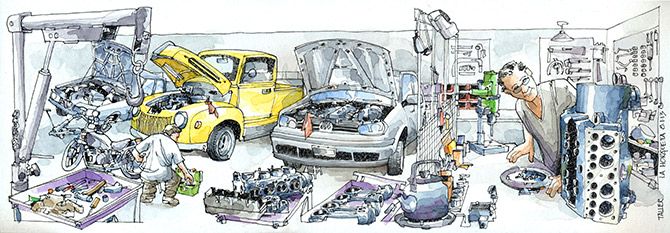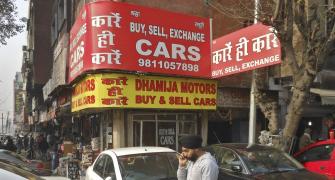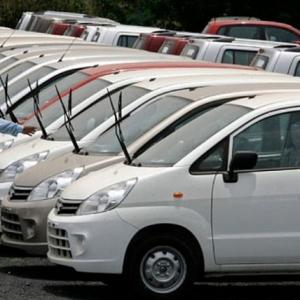An increase in sales across all categories in the automobile industry, has made need for higher working capital inevitable.
Illustration: Courtesy Jorge Royan/Wikimedia Commons
Large corporates like Mahindra and Mahindra and Tata group are throwing their weight behind small component firms through their finance arms to meet the latter’s working capital requirements as banks tighten lending norms amid rising NPAs.
A fast expanding auto market and an impending transition from BSVI to BSIV norms necessitate a massive investment by the suppliers of auto companies. A steep increase in raw material prices is also prompting such suppliers to seek loans from companies like Tata Capital and Mahindra Finance. This is even as the cost of borrowing from them is marginally higher than commercial banks.
A fortnight ago, Hemant Sikka, president and chief purchasing officer of power and spares business at M&M, addressed 90 of its core suppliers and working capital emerged as an issue with some of them, he said.
“Though it’s not a serious issue, we are very vigilant of the situation and doing our bit to help suppliers,” he said adding that M&M has referred quite a few of its suppliers to Mahindra Financial Services.
"Similarly, Tata Motors too has been directing its suppliers to Tata Capital. Over the last one year they have become very active,” said a Tata Motors supplier adding even as the rate of interest is marginally higher, they don’t ask for hypothecation so it makes sense to borrow from them, he said.
An increase in sales across all categories in the automobile industry, has made the need for higher working capital inevitable. In the year that ended in March 2018, sales of passenger vehicles, two-wheelers, three-wheelers and commercial vehicles rose 8 per cent, 15 per cent, 24 per cent and 20 per cent, respectively, as per Society of Indian Automobile Manufacturers.
If that wasn’t enough, automakers will have to pump in an estimated Rs 500 billion by the turn of this decade to leapfrog from BS IV to BS VI emission standards, an expert committee appointed by the government had said in February 2016. The quantum of investment already made by the industry is not known.
Vinnie Mehta, director general at automotive component manufacturers association said typically, going by the thumb rule, the auto component industry’s investments are two and half times of the automakers.
While large tier one suppliers who are well capitalised, are able to make the investment and meet the capital requirements without any support from the auto companies, the smaller suppliers in the low-end of the value chain are struggling, said ACMA’s Mehta.
A sharp increase in the raw materials such as steel, by as much as 15 to 20 per cent over the last one year, is adding to the woes, said a Tata Motors supplier declining to be identified.
“We are paying a higher price to buy the same quantity but selling the finished parts to companies at the older price. The original equipment manufacturers compensate us for the increase only with a lag. This is further stretching the working capital. As it is the requirement of working capital has gone up owing to higher demand from companies,” he said.
Another Delhi-based supplier which counts Maruti Suzuki India, Tata Motors and M&M as its key customers, said quite a few auto component makers have opted out of bill discounting from the OEMs in the recent past as the cost of finance from the instrument has gone up recently. Owing to an uncompetitive rate, suppliers are opting to get paid after the 60 to 90 days as is the norm. This too is mounting pressure on working capital needs.
Jayant Davar, co-chairman and managing director, Sandhar Group said while his company has not been facing any issues, nor are the smaller suppliers who feed into his company as Sandhar offers them line of credit, “there is definitely a cash crunch,” particularly for small and medium enterprises.
“The banks have cut down credit and have become a lot more stringent,” he said.










